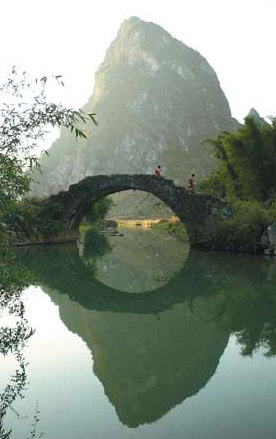Quaint town is home to hidden treasures
Updated: 2013-01-24 06:02
By Sindy Chan (China Daily)
|
||||||||
|
The charm of Baiwan town in northern Guangdong province lies in its primitiveness. Nam Nai Choi / For China Daily |
Boiling hot summers attract the bugs, bitterly cold winters bring frost and rain, autumns are too dry and springs too humid. These are the challenges nature brings to Baiwan, a mountainous town in northern Guangdong province.
Despite the extreme weather conditions, cassava, corn, soybean, peanut, sweet potato, vegetable and rice grow out of the infertile soil.
These fruits of the earth produce some of the loveliest local delicacies: cakes made of cassava flour, porridge cooked using corn powder mixed with rice, nutritious milk and bean curd from soybeans, cooking oil extracted from peanuts and delicious and healthy steamed or baked sweet potatoes.
Children in the town are familiar with a fun way of baking sweet potatoes in the fields. First, dig a big hole on the ground, then stack up rounded mud balls to form a "beehive" and put in charcoal pieces to heat up the beehive.
When the mud is heated up, remove the coals, place the sweet potatoes between the mud balls and collapse the beehive. Within 30 minutes, you will get mouthwatering sweet potatoes baked using hot mud.
If you visit Baiwan and see people baking in the fields, it is worth buying a couple of sweet potatoes or whatever is cooking to taste the difference.
Baiwan farmers are also well-known for their meat products. Tasty tender chicken and meaty pork cooked in the local style are some of the must-try dishes.
Mountains in Baiwan may remind visitors of Guilin, as both places share the same karst topography stretching across Guangdong province and Guangxi Zhuang autonomous region.
Because of the high concentration of limestone, water in Baiwan is rich in calcium, which strengthens bones and teeth.
But the true attraction of Baiwan lies in its primitiveness. It is common to see village women carrying bamboo shoots freshly picked from the forest or drying yuba or bean-curd skin under the house eaves.
Elderly people prepare their coffins ahead of time and store the coffins at the attic.
And you are bound to meet curious and friendly children with local accent and vocabulary asking, "What are you doing here?"
"Left-home children" remains an issue here. Young parents work in big cities to earn a better living for the family, leaving their children behind where parenting has to be done by grandparents or relatives.
The town is small but there is a backpacker's accommodation, a food market, and several grocery stores - some of them even offer grilled sausage, seafood and meat as snacks.
You can also consider the option of spending a night in nearby Qingyuan city - located only two-and-a-half-hour drive away - where you can hire a boat to go down the Beijiang River that runs through the center of Qingyuan. Bring your own ingredients and request the boatman to cook you a meal, local style.
The following day head down to Yingde, where you can spend half a day exploring the town's beautiful mountains and creeks. Then, spend the evening in one of the guest houses in Yingde.
Like many remote destinations in China, Baiwan tourism is growing in gentle steps. More visitors learn about this quaint place as part of the famous "West Yingde Corridor of Mountain Ranges".
For tourists looking for monumental attractions, the century-old Yang Gong Temple built in early Song Dynasty (960-1279) and Nationalist Government General Chen Keyu's summer residence are definitely the hidden treasures of Baiwan.
If you have more time, spend a few more days exploring Baiwan and its charming vicinity. You could follow the scent of camphor to find a carpenter's lodge in the forest, and appreciate their masterpieces of Buddha statues, art items and small furniture.
China Daily
(China Daily 01/24/2013 page19)

 In Photos: 7.0-magnitude quake hits Sichuan
In Photos: 7.0-magnitude quake hits Sichuan
 Li Na on Time cover, makes influential 100 list
Li Na on Time cover, makes influential 100 list
 FBI releases photos of 2 Boston bombings suspects
FBI releases photos of 2 Boston bombings suspects
 World's wackiest hairstyles
World's wackiest hairstyles
 Sandstorms strike Northwest China
Sandstorms strike Northwest China
 Never-seen photos of Madonna on display
Never-seen photos of Madonna on display
 H7N9 outbreak linked to waterfowl migration
H7N9 outbreak linked to waterfowl migration
 Dozens feared dead in Texas plant blast
Dozens feared dead in Texas plant blast
Most Viewed
Editor's Picks

|

|

|

|

|

|
Today's Top News
Live report: 7.0-magnitude quake hits Sichuan, heavy casualties feared
Boston suspect cornered on boat
Cross-talk artist helps to spread the word
'Green' awareness levels drop in Beijing
Palace Museum spruces up
First couple on Time's list of most influential
H7N9 flu transmission studied
Trading channels 'need to broaden'
US Weekly

|

|








